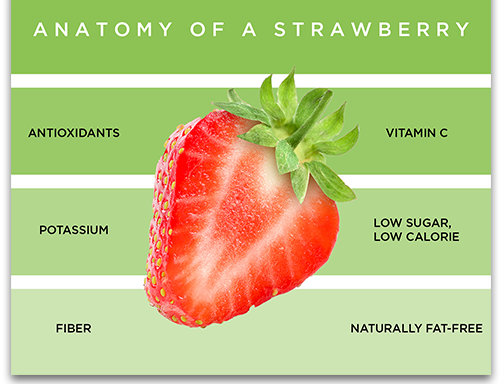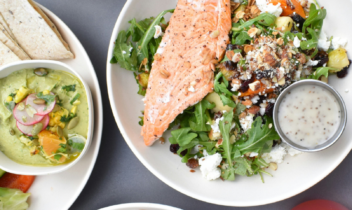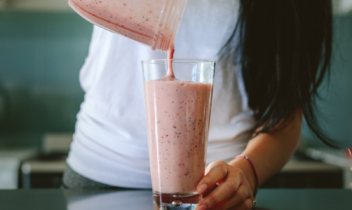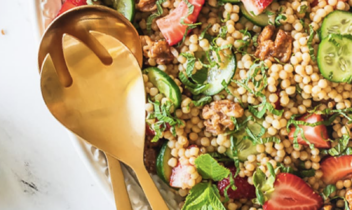
What’s in a strawberry?
Answer
Although small, strawberries are nutritional powerhouses. They are packed with vitamins, minerals, fiber, and phytochemicals that can aid in disease prevention, flavor enhancement, and emotional well-being.

Vitamin C
A one-cup serving of strawberries fulfills the recommended daily value (DV) of vitamin C for an entire day. Vitamin C not only plays a role in immune function, but it also helps form vital parts of the body like blood vessels, cartilage, muscle, and collagen in bones. Vitamin C helps the body absorb iron from plant foods and is an antioxidant that fights free radicals believed to be linked to heart disease and cancer.[1]
Potassium
A serving of strawberries has 5% of the recommended DV of potassium. Potassium helps balance electrolytes, aids in muscle contractions, and may help prevent strokes through better blood pressure control.[2]
Folate
As one of the powerful B vitamins, folate helps form red blood cells and assists all cells in the body in functioning properly. Folate is also important during pregnancy to help prevent birth defects.[3] A serving of strawberries provides 9% of the recommended DV of folate.
Fiber
Fiber is essential to lowering blood cholesterol and keeping the digestive system healthy. Strawberries have 3 grams of fiber per serving, which is 12% DV for women and 8% DV for men under 50 years old.[4]
Ellagic Acid
Ellagic acid is a phytochemical (a nutrient found in plants) that helps protect the liver, treat pancreatitis, and may assist in preventing aging skin, cancer, and leukemia. It has antioxidant, anti-mutagenic, and anti-cancer properties.[5]
Flavonoids
Flavonoids are phytochemicals that are being researched for their potential to prevent weight gain, atherosclerosis, cancer, heart disease, and Alzheimer’s disease. Flavonoids have an array of health benefits including antioxidants that fight off free radicals and oxidative stress, the ability to reduce inflammation, and they help the immune system fight off everyday toxins.[6]
Fisetin
Strawberries have the highest concentration of fisetin, another phytochemical.[7] Several studies indicate that fisetin is a promising novel antioxidant and is being studied for its use in preventing cancer and neurodegenerative diseases. Fisetin also has been shown to act as an anti-depressant in mice and may have mood-lifting effects in humans as well. Science shows that as people eat more fruits and vegetables, their feelings of short-term happiness and long-term life satisfaction improve.[8]
References:
[1] The Nutrition Source. (2021). Vitamin C. Harvard T. Chan School of Public Health. https://www.hsph.harvard.edu/nutritionsource/vitamin-c/
[2] Centers for Disease Control and Prevention. (2018). The role of potassium and sodium in your diet. Retrieved from: https://www.cdc.gov/salt/potassium.htm
[3] Mayo Clinic. (2021). Folate (folic acid). The Mayo Clinic. https://www.mayoclinic.org/drugs-supplements-folate/art-20364625
[4] Mayo Clinic. (2021). Dietary fiber: Essential for a healthy diet. The Mayo Clinic. https://www.mayoclinic.org/healthy-lifestyle/nutrition-and-healthy-eating/in-depth/fiber/art-20043983
[5] Alfei, S.; Marengo, B.; Zuccari, G. Oxidative Stress, Antioxidant Capabilities, and Bioavailability: Ellagic Acid or Urolithins? Antioxidants 2020, 9, 707. https://doi.org/10.3390/antiox9080707
[6] Panche, A. N., Diwan, A. D., & Chandra, S. R. (2016). Flavonoids: an overview. Journal of nutritional science, 5, e47. https://doi.org/10.1017/jns.2016.41
[7] Khan, N., Syed, D. N., Ahmad, N., & Mukhtar, H. (2013). Fisetin: a dietary antioxidant for health promotion. Antioxidants & redox signaling, 19(2), 151–162. https://doi.org/10.1089/ars.2012.4901
[8] Mujcic, R. & Oswald, A.J. (2016). Evolution of well-being and happiness after increases in consumption of fruit and vegetables. American Journal of Public Health 106. 1504-1510. https://doi.org/10.2105/AJPH.2016.303260


